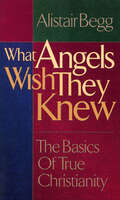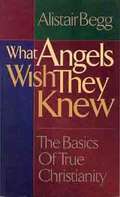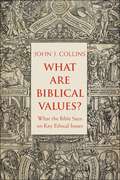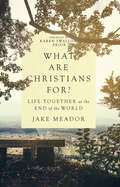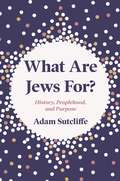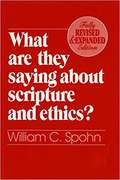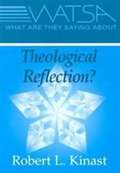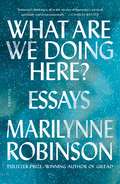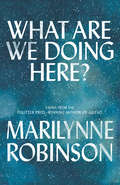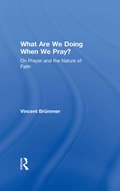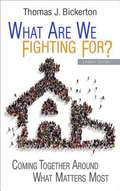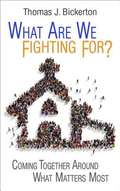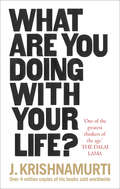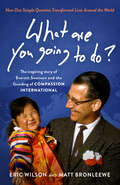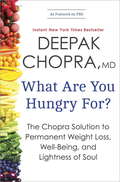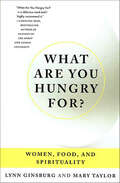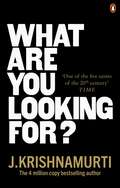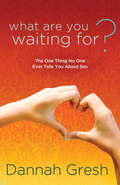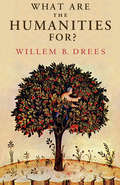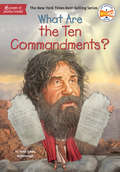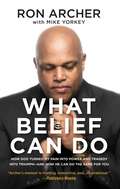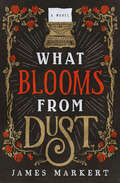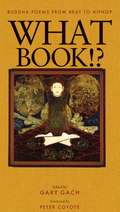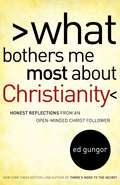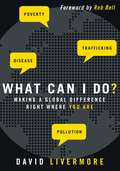- Table View
- List View
What Angels Wish They Knew
by Alistair BeggIn an age that grants plausibility to every idea and certainty to none...WHAT CAN YOU BELIEVE?If you've ever wandered a mall, browsed a bookstore, or explored the Internet, you've seen the evidence: We live in a culture desperately searching for meaning. Like the ancient Greeks, we are haunted by questions. Where did this world come from? Why am I here? As individuals and as a society, we are restless, longing for something, or someone, to believe in.There are perhaps millions of potential answers—but only one truth that wholly explains, resolves, and offers hope for the plight of man. Of this life-giving message, Peter, the disciple of Jesus Christ, wrote: "Even angels long to look into these things." Within these pages, author Alistair Begg explores "these things" more fully, offering fresh insights into the mystery and power of the gospel account and presenting a convincing argument to all those seeking answers to the meaning of life.
What Angels Wish They Knew: The Basics of True Christianity
by Alistair BeggAlistair Begg probes the search for the meaning of life, what the Bible says about it, how we can serve our "original purpose" and obtain fulfilment.
What Are Biblical Values?: What the Bible Says on Key Ethical Issues
by John CollinsAn illuminating exploration of the Bible and many of our most contentious contemporary issues Many people today claim that their positions on various issues are grounded in biblical values, and they use scriptural passages to support their claims. But the Bible was written over the course of several hundred years and contains contradictory positions on many issues. The Bible seldom provides simple answers; it more often shows the complexity of moral problems. Can we really speak of “biblical values”? In this eye-opening book, one of the world’s leading biblical scholars argues that when we read the Bible with care, we are often surprised by what we find. Examining what the Bible actually says on a number of key themes, John Collins covers a vast array of topics, including the right to life, gender, the role of women, the environment, slavery and liberation, violence and zeal, and social justice. With clarity and authority, he invites us to dramatically reimagine the basis for biblical ethics in the world today.
What Are Christians For?: Life Together at the End of the World
by Jake MeadorWhat does a Christian political witness look like in our day? Politics ought to be defined by fidelity to the common good of all the members of society. But our modern Western politics are defined by a determination to bend the natural world and human life to its own political and economic ends. This wholesale rejection of the natural order is behind the dominant revolutions in our history, and defines our experience in Western society today���our racialized hierarchy, modern industry, and the sexual revolution. In What Are Christians For?, Jake Meador lays out a proposal for a Christian politics rooted in the givenness and goodness of the created world. He is uninterested in the cultural wars that have so often characterized American Christianity. Instead, he casts a vision for an ordered society that rejects the late modern revolution at every turn and is rooted in the natural law tradition and the great Protestant confessions. Here is a political approach that is antiracist, anticapitalist, and profoundly pro-life. A truly Christian political witness, Meador argues, must attend closely to the natural world and renounce the metallic fantasies that have poisoned common life in America life for too long.
What Are Jews For?: History, Peoplehood, and Purpose
by Adam SutcliffeA wide-ranging look at the history of Western thinking since the seventeenth century on the purpose of the Jewish people in the past, present, and futureWhat is the purpose of Jews in the world? The Bible singles out the Jews as God’s “chosen people,” but the significance of this special status has been understood in many different ways over the centuries. What Are Jews For? traces the history of the idea of Jewish purpose from its ancient and medieval foundations to the modern era, showing how it has been central to Western thinking on the meanings of peoplehood for everybody. Adam Sutcliffe delves into the links between Jewish and Christian messianism and the association of Jews with universalist and transformative ideals in modern philosophy, politics, literature, and social thought.The Jews have been accorded a crucial role in both Jewish and Christian conceptions of the end of history, when they will usher the world into a new epoch of unity and harmony. Since the seventeenth century this messianic underlay to the idea of Jewish purpose has been repeatedly reconfigured in new forms. From the political theology of the early modern era to almost all domains of modern thought—religious, social, economic, nationalist, radical, assimilationist, satirical, and psychoanalytical—Jews have retained a close association with positive transformation for all. Sutcliffe reveals the persistent importance of the “Jewish Purpose Question” in the attempts of Jews and non-Jews alike to connect the collective purpose of particular communities to the broader betterment of humanity.Shedding light on questions of exceptionalism, pluralism, and universalism, What Are Jews For? explores an intricate question that remains widely resonant in contemporary culture and political debate.
What Are They Saying About Scripture and Ethics
by William SpohnTraces recent developments in the turn to Scripture in Christian ethics among Protestant and Roman Catholic theologians. Special attention is paid to new questions in hermeneutics, spirituality, feminist and Latin American liberation theologies, and character ethics.
What Are They Saying About Theological Reflection?
by Robert L. KinastTheological reflection is a form of theologizing that begins with lived experience, correlates this with the sources of Christian faith and draws out concrete implications for praxis. Robert Kinast finds five distinct types of theological reflection from within this common form: ministerial, spiritual wisdom, feminist, inculturation, and practical theology. Each of these styles is analyzed in terms of the type of experience it favors, the way it connects this experience to theology and what sort of praxis it envisions. The end result is a succinct overview of this wide-ranging and diverse approach to theology.
What Are We Doing Here?: Essays
by Marilynne RobinsonNew essays on theological, political, and contemporary themes, by the Pulitzer Prize winnerMarilynne Robinson has plumbed the human spirit in her renowned novels, including Lila, winner of the National Book Critics Circle Award, and Gilead, winner of the Pulitzer Prize and the National Book Critics Circle Award. In this new essay collection she trains her incisive mind on our modern political climate and the mysteries of faith. Whether she is investigating how the work of great thinkers about America like Emerson and Tocqueville inform our political consciousness or discussing the way that beauty informs and disciplines daily life, Robinson’s peerless prose and boundless humanity are on full display. What Are We Doing Here? is a call for Americans to continue the tradition of those great thinkers and to remake American political and cultural life as “deeply impressed by obligation [and as] a great theater of heroic generosity, which, despite all, is sometimes palpable still.”
What Are We Doing Here?: Essays
by Marilynne RobinsonNew essays on theological, political, and contemporary themes, by the Pulitzer Prize winner.Marilynne Robinson has plumbed the human spirit in her renowned novels, including Lila, winner of the National Book Critics Circle Award, and Gilead, winner of the Pulitzer Prize and the National Book Critics Circle Award. In this new essay collection she trains her incisive mind on our modern political climate and the mysteries of faith. Whether she is investigating how the work of great thinkers about America like Emerson and Tocqueville inform our political consciousness or discussing the way that beauty informs and disciplines daily life, Robinson's peerless prose and boundless humanity are on full display. What Are We Doing Here? is a call for Americans to continue the tradition of those great thinkers and to remake political and cultural life as "deeply impressed by obligation [and as] a great theater of heroic generosity, which, despite all, is sometimes palpable still."
What Are We Doing When We Pray?: On Prayer and the Nature of Faith
by Vincent BrümmerVincent Brümmer's classic book on prayer from 1984 provides a comprehensive philosophical analysis of central issues regarding the nature and practice of prayer. What do we do when we ask things of other people, when we thank them or praise them, when we express penitence for what we have done to them and ask their forgiveness? And how does doing these things in relation to God differ from when we do them in relation to other people? And what does this entail for the existence and nature of the God to whom we pray? This new edition has been substantially revised and updated. Three new chapters have been added which develop in detail a hint by G.K. Chesterton that faith 'is not a thing like a theory but a thing like a love affair.' Since prayer is the expression of this 'love affair' it is also the clue to understanding the nature of faith. These chapters contribute significantly to the current academic interest in spirituality by showing how Brümmer's analysis of prayer helps us to understand the nature of spirituality, of faith and religious belief, and of theology. Spirituality is not aimed at achieving religious 'experiences' or mystical 'knowledge' about God; it is primarily aimed at attaining the religious form of life and at coming to see the world in the light of faith. Religious belief is not merely a cognitive enterprise like science; it cannot be divorced from spirituality and the life of faith, and is therefore fundamentally existential and not merely intellectual. Serving as a valuable core text for students, this book also contributes to a number of current debates in theology and philosophy of religion: the debates on realism and religious belief, on the rationality of faith and the nature of theology, on the relation between religious belief and morality, on the relation between science and religion and the lively debate among evangelical Christians in America on the 'openness of God.'
What Are We Fighting For? Leader Guide: Coming Together Around What Matters Most (What Are We Fighting For?)
by Thomas J. BickertonWith all the issues facing The United Methodist Church today, there are plenty of theories and opinions about what we should do. Frankly, many of us are weary of the relentless bickering associated with all the rhetoric. What are we fighting for? This question not only points us to the futility of our disunity but also compels us to consider what we are fighting for—what deserves our greatest intensity and effort as we seek to be faithful followers of Jesus Christ.Bishop Thomas J. Bickerton offers a way to move beyond all the discord to a hope-filled future by exploring how we can come together around what matters most so that the gospel of Jesus Christ becomes a vibrant part of our lives and witness. He says that fights, feuds, and uncertainties can distract us, leaving us ineffective and mired in mediocrity and decline; but focusing on what matters most causes our ministries to flourish and the church to become a relevant and vital presence in the community and world.With a warm and practical approach, he leads us on a journey of discernment, inviting us to explore: the spiritual problem at the heart of the issues we’re facing, three foundational reminders, guidelines for determining the essentials necessary to make disciples, a motto for working together in the midst of disagreement, and thoughts about the ultimate essential, love.This Leader Guide includes everything a group leader needs to plan and facilitate the six sessions, helping participants to explore what they have read, to view a video, and to discuss the reading and video with the group. The guide walks leaders through the study format and provides options for tailoring sessions to the time-frame and style of each group.
What Are We Fighting For?: Coming Together Around What Matters Most (What Are We Fighting For?)
by Thomas J. BickertonWith all the issues facing The United Methodist Church today, there are plenty of theories and opinions about what we should do. Frankly, many of us are weary of the relentless squabbling associated with all the rhetoric. What are we fighting for? This question not only points us to the futility of our disunity but also compels us to consider what we are fighting for—what deserves our greatest intensity and effort as we seek to be faithful followers of Jesus Christ.Thomas J. Bickerton offers a way to move beyond all the discord to a hope-filled future by exploring how we can come together around what matters most so that the gospel of Jesus Christ becomes a vibrant part of our lives and witness. He says that fights, feuds, and uncertainties can distract us, leaving us ineffective and mired in mediocrity and decline; but focusing on what matters most causes our ministries to flourish and the church to become a relevant and vital presence in the community and world. With a warm and practical approach, he leads us on a journey of discernment, inviting us to explore: the spiritual problem at the heart of the issues we’re facing, three foundational reminders, guidelines for determining the essentials necessary to make disciples, a motto for working together in the midst of disagreement, and thoughts about the ultimate essential, love.Each chapter includes practical stories of real people and churches who are attempting to stay centered on what matters most as they live out the calling to make disciples of Jesus Christ for the transformation of the world. Whether you read the book alone or as part of a group study, you will find the courage to say yes to the things that are worth fighting for and no to the fighting that so easily distracts us.
What Are You Doing With Your Life?
by J. Krishnamurti'One of the greatest thinkers of the age' The Dalai Lama'One of the five saints of the 20th century' - TIME magazine 'Krishnamurti influenced me profoundly' - Deepak Chopra Who are you?What are you?What do you want from life? One of the world's great philosophical teachers, Krishnamurti, offers his inspiring wisdom on many of life's hurdles from relationships and love, to anxiety and loneliness. He answers such questions as 'What is the significance of life?' and 'How do I live life to the full?' to reveal the best way of being true to yourself. Read by millions from all walks of life, Krishnamurti shows us there is no path, no higher authority, no guru to follow, and that ultimately it is our own responsibility as to how we live our lives.
What Are You Going to Do?: How One Simple Question Transformed Lives Around the World: The Inspiring Story of Everett Swanson and the Founding of Compassion International
by Eric Wilson Matt BronleeweWhat Are You Going to Do? tells an inspiring true story. In the early 1950s, war scattered hundreds of thousands of orphans across South Korea. Many Koreans sacrificed everything to help. When Everett Swanson arrived to preach to troops on the front lines, he stumbled upon starving orphans. The plight of these children broke his heart. He faced the question: &“What are you going to do?&”Authors Matt Bronleewe and Eric Wilson tell how Swanson&’s answer to those six little words led to the organization known today as Compassion International. Seventy years later, Compassion International sponsors over two million children all over the world, providing meals, education, vocational training, Bibles, letters of support, and more.We are often faced with the same question, &“What am I going to do?&” And, like Swanson, we feel inadequate, afraid, or ill-equipped. Readers will see how small faithful choices can lead to larger ones—and in so doing, change the world for generations to come. Everyone—young and old—should be acquainted with this amazing story of faith, courage, and compassion.
What Are You Hungry For?
by Deepak ChopraBasis for the upcoming PBS Special!After promoting this message worldwide for thirty years, bestselling author Deepak Chopra focuses on the huge problem of weight control in America with exciting new concepts. What Are You Hungry For? is the breakthrough book that can bring weight under effortless control by linking it to personal fulfillment in every area of a reader's life. What are you hungry for? Food? Love? Self-esteem? Peace? In this manual for "higher health," based on the latest findings in both mainstream and alternative medicine, Deepak Chopra creates a vision of weight loss based on a deeper awareness of why people overeat - because they are trying to find satisfaction and wind up using food as a substitute for real fulfillment. Repudiating the failed approaches of crash dieting and all forms of deprivation, Chopra's new book aims directly at the problem of finding fulfillment. When that problem is solved, he argues, normal eating falls into place automatically, and the entire system of mind and body achieves what it really desires. "Everyone's life story is complicated, and the best intentions go astray because people find it hard to change," writes Chopra. "Bad habits, like bad memories, stick around stubbornly when we wish they'd go away. But you have a great motivation working for you, which is your desire for happiness. I define happiness as the state of fulfillment, and everyone wants to be fulfilled. If you keep your eye on this, your most basic motivation, then the choices you make come down to a single question: "What am I hungry for?" Your true desire will lead you in the right direction. False desires lead in the wrong direction." Wherever you are in life, this book will help point you in that right direction.
What Are You Hungry For?: Women, Food, and Spirituality
by Mary Taylor Lynn GinsburgWomen have many secrets. But a woman's secret relationship with food and her body can overshadow other aspects of her life, filling her with obsession, shame and fear. Many women waste countless years focusing on food and appearance, rather than spending energy on what holds deepest meaning for them in life.In What Are You Hungry For? authors Taylor and Ginsburg show how obsessive dieting, a distorted body image and eating disorders are often symptoms of a deep spiritual void. They offer a revolutionary--and easy to follow--approach to resolving deep-seated food and body issues using methods adapted from Eastern mind/body practices such as yoga. What Are You Hungry For? is a discovery book in the tradition of Susie Orbach's Fat is a Feminist Issue and Geneen Roth's When Food is Love. It will change the way you think about your body and the way you approach preparing and eating every single meal."Finally, an insightful book that ties together food and our spiritual practice What Are You Hungry For? provides both philosophical and practical ways to understand our relationship with what we take into our bodies and to how we are following our internal voices." --Rodney Yee, yoga teacher and star of the bestselling video series "Yoga Journal's Yoga with Rodney Yee"
What Are You Looking For?
by J. KrishnamurtiFOUR MILLION COPY BESTSELLING AUTHOR 'One of the greatest thinkers of the age' The Dalai Lama What is love?Who am I without my relationships? What is the relationship between myself and society?One of the world's greatest philosophical teachers, Krishnamurti, offers his inspiring wisdom on a core feature of life: our relationships. From parents to partners and colleagues to friends, Krishnamurti answers our deepest defining questions and reveals a path to truly loving yourself, others and the world around you.
What Are You Waiting For?: The One Thing No One Ever Tells You About Sex
by Dannah GreshIf you need satisfying answers to your questions about sex, Dannah Gresh has one (surprising) word for you. Dannah follows the trail of one provocative, ancient word through the Bible to discover God's deepest thoughts about sex. The mind-blowing truth she uncovers clearly points the way to a sexuality that's satisfying and real and everything God designed it to be. Not one to shy away from edgy topics, Dannah candidly shares straight talk about: masturbation and pornography-- the ground-breaking science that explains the addictive power of romantic experiences -- honest answers about the lesbian question -- a clear plan for breaking free from sexual guilt -- the unexpected key to a lifetime of truly fulfilling intimacy. If you're a young woman looking for honest answers about sex--and wondering why it's such a big deal to God--you've come to the right place. In these pages you'll discover a life-changing truth that no one ever talks about--a truth that will transform everything you think you know about sex, romance, and God. So what are you waiting for? The answer is right inside.
What Are the Humanities For?
by Willem B. DreesWhat are the humanities for? The question has perhaps never seemed more urgent. While student numbers have grown in higher education, universities and colleges increasingly have encouraged students to opt for courses in STEM (science, technology, engineering and mathematics) or take programs in applied subjects like business and management. When tertiary learning has taken such a notably utilitarian turn, the humanities are judged to have lost their centrality. Willem B. Drees has no wish nostalgically to prioritize the humanities so as to retrieve some lost high culture. But he does urge us to adopt a clearer conception of the humanities as more than just practical vehicles for profit or education. He argues that these disciplines, while serving society, are also intrinsic to our humanity. His bold ideas about how to think with greater humanistic coherence mark this topical book out as unmissable reading for all those involved in academe, especially those in higher educational policy or leadership positions.
What Are the Ten Commandments? (What Was?)
by Yona Zeldis Mcdonough Tim Foley Who HqLearn the story behind the ten laws that have been the guiding light of Judeo-Christian belief.Not just about Moses, whose origin story leaves open questions, this book looks back at the time when the commandments were written, how the belief in one all-powerful God set the Israelites apart from other ancient peoples, and the roles the Ten Commandments have played in Judaism, Christianity, and Islam. It also looks at what each individual commandment means and how together they form the basis of leading a moral life as well as forming a just government.
What Belief Can Do: How God Turned My Pain into Power and Tragedy into Triumph--and How He Can Do the Same for You
by Ron Archer&“Riveting.&” -Publishers Weekly Ron Archer&’s story will inspire you to trust God with the impediments facing you, whether big or small. Born to a biracial teenage mother forced by poverty to become a call girl, he survived an abortion his mother&’s pimp forced her to have. Abused by some, bullied by others, and rejected by a stepfather, Ron was a stutterer, a bed-wetter, and an overweight kid who banged his head against the wall to knock himself to sleep at night. At age ten, he decided to take his own life. The gun did not fire. Afterward, a schoolteacher and a widowed neighbor stepped in and shared the love of God with him—forever changing his life. In this message-driven memoir, Archer shows readers how regardless of background and experiences, God can transform your pain into power and your misery into ministry. In What Belief Can Do, readers will discover: • Everything we go through in life is a down payment on our destiny. • We are conceived and born with a divine design. • Loving, caring people who mentor a child can change his or her life. • Sometimes our greatest blessings are contained in our greatest challenges.
What Blooms from Dust: A Novel
by James Markert"The closer he got, the brighter that red became. It was a rose—a rose that had no earthly business growing there, right in the middle of all that dust."Just as Jeremiah Goodbye is set to meet his fate in the electric chair, he is given a second chance at life. With the flip of a coin, he decides to return to his home town of Nowhere, Oklahoma, to settle the score with his twin brother Josiah. But upon his escape, he enters a world he doesn&’t recognize—one that has been overtaken by the Dust Bowl. And the gift he once relied on to guide him is as unrecognizable as the path back to Nowhere.On his journey home, he accidentally rescues a young boy, and the pair arrive at their destination where they are greeted by darkened skies and fearful townspeople who have finally begun to let the past few years of hardship bury them under the weight of all that dust. Unlikely heroes, Jeremiah and his new companion, Peter Cotton, try to protect the residents of Nowhere from themselves, but Jeremiah must face his nightmares and free himself from the guilt of his past and the secrets that destroyed his family.Filled with mystery and magic, this exquisite novel from award-winning author James Markert is a story of finding hope in the midst of darkness and discovering the beauty of unexpected kindness.
What Book!?
by Peter Coyote Gary GachWhat Book!? is a lively anthology of modern mindful poetry, featuring 330 selections from 125 contributors. Also included are "mind-writing exercises" by Allen Ginsberg and a meditation by Thich Nhat Hanh.Themes include love, nature, pacifism and violence, the avant-garde, family, silence, and song. The contents include original work and translations; performance art and conceptual art; lyrics, arias, and blues; picture poems and calligraphy; prose poetry and sonnets; haiku; meditations and sutras; journal entries; bucolics; jeremiads; postmodernism; and other artifacts from the intersection of meditation and art.Its rich tapestry of voices includes Peter Coyote, Maxine Hong Kingston, Yoko Ono, Czeslaw Milosz, Robinson Jeffers, Yusef Komunyakaa, Lawson Inada, Allen Ginsberg, Jack Kerouac, Lawrence Ferlinghetti, Laurie Anderson, John Cage, Thomas Merton, Robert Aitken, Norman Fischer, Gary Snyder, Diane de Prima, Mary Oliver, Stephen Mitchell, bell hooks, Adam Yauch, brand-new discoveries, and children of all ages.
What Bothers Me Most about Christianity
by Ed GungorA Provocative Discussion on the Messiness of Faith It may seem odd that an avowed Christ follower would write a whole book on the bothersome aspects of Christianity. But if we're honest, we can't ignore the fact that some things about Christianity are just plain messy. Without fear or hesitation, Ed Gungor joins the discussion generated by the multitude of atheistic books, as he explores the most difficult aspects of the Christian faith, including... Why doesn't God just show Himself? Why does a loving God allow evil in His world? If the Christian faith is so good, why are some Christians so bad? Why was God so harsh during Old Testament times? Why is the Christian faith so exclusive? Maintaining that faith is not intellectual suicide and that mystery is an essential quality of the Christian belief, Gungor speaks with reason, candor, and a touch of humor to thinking people on both sides of the debate.ussion between thinking people on both sides of the debate, from aggressive atheists to unswerving Christian believers. Gungor maintains that balancing faith and reason is indeed possible and that devoted Christ followers need not shy away from asking the tough questions. As he guides readers through these fundamental issues, they will find that their honest wrestling will actually bring them to a deeper, more mature understanding of faith.
What Can I Do?: Making a Global Difference Right Where You Are
by David LivermoreWhile “missions” used to be the territory of experts and missionary professionals, globalization has made the issues and needs of our world accessible to average Americans. Many American Christians feel overwhelmed by the scope of the brokenness in the world and conclude all they can do is go on with their lives. Others respond by giving and praying, and still others want to do more. What Can I Do shows that global mission is something we all can be part of in tangible ways. And while that might include going on a short term mission trip or providing financial support, there are many more ongoing and holistic forms of engagement. This book helps readers see that the roles they already have—business leader, scientist, teacher, student, parent, or neighbor—can provide ways to engage in global mission. Mission is what we were created to do. It includes evangelistically calling people to follow Jesus wherever we go, whatever we do. But it’s more than that. This book will help us explore the way our ordinary, everyday tasks of work and life can be part of God’s mission to heal a broken world.
